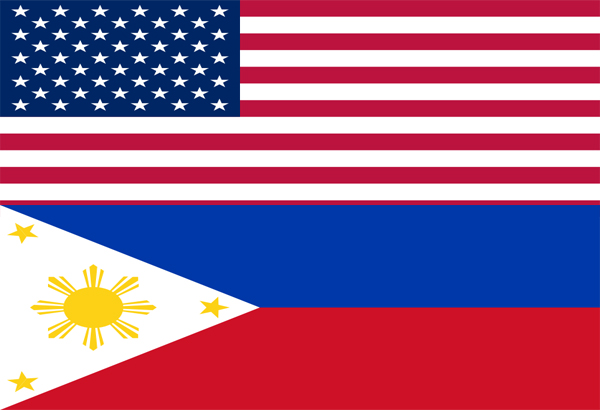
The need to enhance the Philippines’s security capabilities was discussed during the meeting of Defense Secretary Voltaire Gazmin and US Pacific Command chief Adm. Harry Harris in Camp Aguinaldo.
The United States on Wednesday vowed to help the Philippines strengthen its intelligence gathering capabilities as the two countries agreed to work together to maintain regional stability.
The need to enhance the Philippines’s security capabilities was discussed during the meeting of Defense Secretary Voltaire Gazmin and US Pacific Command chief Adm. Harry Harris in Camp Aguinaldo.
“It was agreed that developing the capability of the Armed Forces of the Philippines (AFP) is of paramount importance, specifically in the areas of intelligence, surveillance, and reconnaissance and command and control,” Defense department spokesman Peter Galvez said in a statement.
“They agreed that they will be assessing how best they can assist us in those areas,” he added in a separate phone interview.
Galvez could not provide specifics as to how the US plans to boost the defense capabilities of the Philippines, its oldest ally in Asia.
The two countries, nevertheless, agreed to cooperate in information-sharing and in helping maintain regional stability.
“The Secretary of National Defense and the Commander of the US Pacific Command shared the sense that the Philippines and the US will continue to work together to enhance regional security,” Galvez said.
“In addition to building the AFP’s capability, there was also an agreement to cooperate on information sharing through the crafting of a General Security of Military Information Agreement,” he added.
When asked if the information-sharing agreement will cover the South China Sea dispute, Galvez replied: “It will be all-encompassing. It will cover all security concerns including maritime issues, anti-terrorism efforts and other transnational security issues.”
Galvez said Harris had also acknowledged that enhanced information sharing would further enhance the interoperability between the AFP and the US Pacific Command.
Harris arrived in Manilafor a three-day visit that aims to boost the security ties between the Philippines and the US.
He called on AFP chief Gen. Hernando Iriberri and Gazmin in Camp Aguinaldo on Wednesday morning before meeting with National Coast Watch Council Undersecretary Jose Alano in Manila in the afternoon. Harris capped his courtesy calls with a meeting with President Aquino in Malacañang.
Harris is also scheduled to meet on Thursday with AFP Western Command chief Vice Adm. Alexander Lopez in Palawan, the province nearest the disputed Spratlys chain.
AFP spokesman Col. Restituto Padilla said Harris had briefed Iriberri about Washington’s maritime security strategy in the Asia Pacific as contained in a report released recently by the US State Department.
“What transpired during the dialogue was a frank and honest exchange of ideas regarding the evolving security challenges in the region as a result of natural disasters and issues involving the West Philippine Sea and the South China Sea ensued during the dialogue,” Padilla said.
Padilla said the report recognized the importance of the Asia-Pacific region and its maritime domain for the security of the United States.
“It is focused on safeguarding freedom of the seas, deterring conflict and coercion, and promoting adherence to international law and standards in order to preserve the peace and security the Asia-Pacific region has enjoyed for the past 70 years,” he added.
Padilla, however, admitted that the US did not make any concrete commitments during the meeting.
He noted that the US State Department report enumerated “lines of effort” to preserve security in the region.
These are strengthening US military capacity “to deter conflict and coercion and respond decisively when needed,” working with allies to build their capacity to address potential challenges; leveraging military diplomacy “to build greater transparency, reduce the risk of miscalculation” and promote shared maritime rules;” and working to strengthen regional security institutions.
“This is very important to the Philippines. It is part of our interest to keep that freedom of the seas going because a lot of trade goes on in these areas,” Padilla said.
Harris’ visit came as the Philippines is embroiled in a territorial row with a militarily superior China over the Spratly Islands and the Panatag (Scarborough) Shoal, a fishing area located off Zambales.
The Philippines has been criticizing China for occupying disputed reefs in South China Sea despite signing a 2002 agreement that prohibits activities that will cause tensions.
China is claiming virtually the whole South China Sea while the Philippines, Vietnam, Malaysia, Brunei and Taiwan have overlapping claims.
To assert its territorial claims, China implemented a massive land reclamation in seven reefs that are also being claimed by the Philippines.
The projects are located in Panganiban (Mischief), Zamora (Subi), Kagitingan (Fiery Cross), Kennan (Chigua), Mabini (Johnson South), Burgos (Gaven) and Calderon (Cuarteron) Reefs.
Satellite photos showed that China is constructing artificial islands with airstrips, radar systems and military barracks, a move that experts believe would impact on freedom of navigation.
http://www.philstar.com/headlines/2015/08/26/1492532/us-vows-help-philippines-intel-gathering

No comments:
Post a Comment
Note: Only a member of this blog may post a comment.